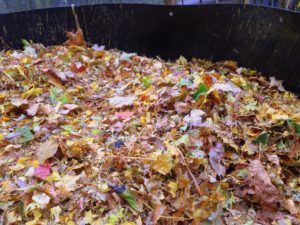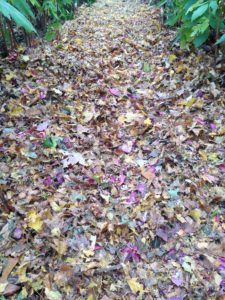The easiest leaves to collect are usually on hard surfaces. That makes street leaves very easy to collect, but that doesn’t mean you should use them.
Consider this: The material that street sweepers collect is generally considered hazardous waste by MA cities and towns. The reasons are pretty simple if you think about it – all of the brake linings, worn off tire crumbles, garbage, leaks from autos and other stuff on the street is in there.
MA state regs state:
Street sweepings shall be used as an additive to compost without prior approval from MassDEP only when the following restrictions and conditions are observed:
- The sweepings have not been collected from Urban Center Roads (see definition);
- The compost is used only in public ways;
- The compost is not used in residential areas;
- The compost is kept above the level of the groundwater;
- The compost is not used in designated “No Salt Areas”;
- The compost is not used within the 100 foot buffer zone of a wetland or within wetland resource areas including bordering vegetative wetlands and riverfront areas;
- The compost is not used within 500 feet of a ground or surface drinking water supply.
While many of us do not technically live on an “Urban Center Road” as defined by MA statute (“Urban center roads means local roads in central commercial and retail business districts and industrial and manufacturing areas.”), I’d be cautious about using material from the street in my gardens for the same reasons, even if there is less traffic.
This concern is especially true after it rains. Those piles of leaves have essentially acted as a filter, capturing all sorts of materials and contaminants that I don’t want anywhere near my carrots and garlic.
Personally, if I find a pile of newly fallen leaves in the street and there’s been no rain (which would carry sediment and contaminants to the leaves which would act as a filter), then I’ll grab and use them. If, however, the leaves have been there any period of time or if there’s been rain, I avoid them.



I was thinking about this thread, using burnt street leaves? Any ideas?
OK, here’s a sad fact Google has lost it’s way. I typed in the simple search, ” Is it safe to use leaves harvested from NYC streets when composting or as mulch? ” The Alliumfields, posted the most relevant answer to my question! Kind of what I had expected, There are issues with poisons, rubber particulate, oil residue and other unknown substances that could mix in and become health issues with mulch and compost. Your thoughtful answer makes a great deal of sense. Unfortunately it was buried 13 deep, behind 12 non relevant results. The truly sad part of it is that the top ranked results where ass-backwards AI non-answers!
Please keep on doing what you do, at least some of us appreciate it.
I and no doubt others rake/sweep up street leaves and such along the curbs in front of our houses, either because the street sweeper has come and gone, or we despair that it will come at all. Should this stuff go to yard waste collection for composting, or into the trash for incineration?
For most of the streets in our community we can safely send it to the municipal yard waste facility. The quantity of contaminants in the municipal facility windrows that are 8′ wide by 5′ tall by 120′ long is significantly lower than if you tried to compost those same materials in your typical home-sized compost bin.
The greatest quantity of contaminants will be on the more major roadways, and those are usually cleared by the municipality itself.